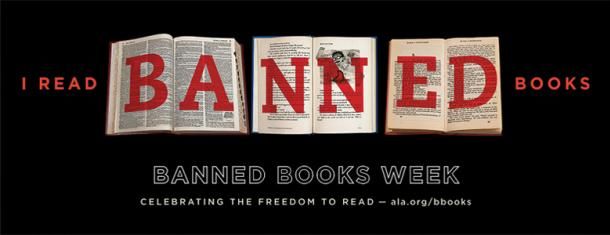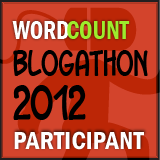The Kansas City Public Library wears its book love on its sleeve (or street)
“Censorship is the enemy of truth – even more than a lie. A lie can be exposed. Censorship can prevent us from knowing the difference.”
– journalist Bill Moyers
Which banned books are on your reading list?
Yes, it’s that time a year again. The annual week-long celebration that reminds us how marvelous it is to live in a country where we are free to read whatever we want. And reminds us that that freedom continues to be challenged every single year.
Banned Book Week launched in 1982 to demonstrate a rising number of challenges targeting schools, bookstores, and libraries. The American Library Association reports that more than 11,000 books have been challenged in the past 30 years. And those are just the demands to restrict that have received publicity.
When I look at the list of classics that have been continually under threat of censorship, as well as which books have made this dubious list each year for the past decade, I’m stumped by one particular reason that crops up often. Of course, there are the prurient excuses, like language or sexual content or the presence of witches and vampires. However, frequently “unsuited to age group” shows up as a reason.
How do “they” decide that? Are young people like a Borg collective, of one mind? Is every 10-year old at the same level of intellectual maturity? How do “they” decide what each individual student is ready to read?
I remember every Saturday riding my bike to the library. I would head to the children’s section in the basement to gather material for a report on agriculture in South America, then stop by the biography section for something on Luther Burbank or Benjamin Franklin, then I’d grab a novel from the fiction shelves. After checking these out I’d head upstairs to the Young Adult room to breeze through Seventeen magazine, wishing I had perfect hair like all the models (over 40 years later it’s still a dream unfulfilled). My final stop would then be the shelves in the balcony of the Adult Reading Room.
Up there I would grab half a dozen books about Jesse James and other outlaws. Next, I’d tackle all the books about serial killers, master criminals, and other historical criminals. It’s there I found Truman Capote’s In Cold Blood. I’d check them out and be on my way (we won't waste time analyzing my obsession with these “true crime” books at such a young age). Most likely they’d fall under the category of “unsuited to age group.” But how did I suffer from my exposure to them? Who had a right to decide that I shouldn’t read them? Or that I shouldn’t sneak into my older sister’s room to read her copy of Bonnie and Clyde or The Godfather?
Yes, it’s that time a year again. The annual week-long celebration that reminds us how marvelous it is to live in a country where we are free to read whatever we want. And reminds us that that freedom continues to be challenged every single year.
Banned Book Week launched in 1982 to demonstrate a rising number of challenges targeting schools, bookstores, and libraries. The American Library Association reports that more than 11,000 books have been challenged in the past 30 years. And those are just the demands to restrict that have received publicity.
When I look at the list of classics that have been continually under threat of censorship, as well as which books have made this dubious list each year for the past decade, I’m stumped by one particular reason that crops up often. Of course, there are the prurient excuses, like language or sexual content or the presence of witches and vampires. However, frequently “unsuited to age group” shows up as a reason.
How do “they” decide that? Are young people like a Borg collective, of one mind? Is every 10-year old at the same level of intellectual maturity? How do “they” decide what each individual student is ready to read?
I remember every Saturday riding my bike to the library. I would head to the children’s section in the basement to gather material for a report on agriculture in South America, then stop by the biography section for something on Luther Burbank or Benjamin Franklin, then I’d grab a novel from the fiction shelves. After checking these out I’d head upstairs to the Young Adult room to breeze through Seventeen magazine, wishing I had perfect hair like all the models (over 40 years later it’s still a dream unfulfilled). My final stop would then be the shelves in the balcony of the Adult Reading Room.
Up there I would grab half a dozen books about Jesse James and other outlaws. Next, I’d tackle all the books about serial killers, master criminals, and other historical criminals. It’s there I found Truman Capote’s In Cold Blood. I’d check them out and be on my way (we won't waste time analyzing my obsession with these “true crime” books at such a young age). Most likely they’d fall under the category of “unsuited to age group.” But how did I suffer from my exposure to them? Who had a right to decide that I shouldn’t read them? Or that I shouldn’t sneak into my older sister’s room to read her copy of Bonnie and Clyde or The Godfather?
The Harry Potter series seems to have taken up permanent residence on the list, but why is my beloved Once and Future King by T.H. White spared? This story of King Arthur was filled with witches and magic and adultery and death. It was a story of good vs. evil. My grandmother gave it to me for Christmas. How was boy wizard’s scar different from the future king’s sword Excalibur?
To celebrate Banned Books Week, I’m going to head to the library this week to check out one of the many wonderful pieces of literature that are challenged the most. If you want to do the same, you can find one on any of these lists:
Banned Books That Shaped America
Frequently Challenged Classics
Challenged Books Year-by-Year
And take a minute to read the reasons they made the list. Some are a hoot. For example, It's So Amazing! A Book about Eggs, Sperm, Birth, Babies, and Families, by Robie H. Harris was cited for sex education and sexual content. Duuuuh. There are no words for this kind of thinking! Barbara Ehrenreich’s Nickeled and Dimed, that insightful book based on her journey through the indignity of a series of minimum wage jobs was tagged for being “political” and “inaccurate.” Excuse me? The beauty of our culture is that you are perfectly free to write your own politics-free book to correct all the inaccuracies you find in hers. I’m sure she’d welcome that kind of challenge.
I leave you with a video of Bill Moyers, an Honorary Chair for this year’s event, talking about what the freedom to read means to him. As always, he’s spot on, especially about the irony of trying to ban Ray Bradbury’s Fahrenheit 451, a book about what the world would be like if censorship were the order of the day.
What kind of control over age-appropriate literature would you propose? What is your favorite banned book or what book (banned or not) did you feel compelled to read in secret? Share your daring literary choices in the comments box.
To celebrate Banned Books Week, I’m going to head to the library this week to check out one of the many wonderful pieces of literature that are challenged the most. If you want to do the same, you can find one on any of these lists:
Banned Books That Shaped America
Frequently Challenged Classics
Challenged Books Year-by-Year
And take a minute to read the reasons they made the list. Some are a hoot. For example, It's So Amazing! A Book about Eggs, Sperm, Birth, Babies, and Families, by Robie H. Harris was cited for sex education and sexual content. Duuuuh. There are no words for this kind of thinking! Barbara Ehrenreich’s Nickeled and Dimed, that insightful book based on her journey through the indignity of a series of minimum wage jobs was tagged for being “political” and “inaccurate.” Excuse me? The beauty of our culture is that you are perfectly free to write your own politics-free book to correct all the inaccuracies you find in hers. I’m sure she’d welcome that kind of challenge.
I leave you with a video of Bill Moyers, an Honorary Chair for this year’s event, talking about what the freedom to read means to him. As always, he’s spot on, especially about the irony of trying to ban Ray Bradbury’s Fahrenheit 451, a book about what the world would be like if censorship were the order of the day.
What kind of control over age-appropriate literature would you propose? What is your favorite banned book or what book (banned or not) did you feel compelled to read in secret? Share your daring literary choices in the comments box.






![Grace [Eventually]: Thoughts on Faith](http://photo.goodreads.com/books/1166504427s/12542.jpg)









7 comments:
Julie, thank you for such an articulate and informed post.It never hurts to be reminded of the vital privilege we are offered (most of the time ...) of freedom of speech and the curious acts of censorship that are deemed necessary by 'them'. Just who are they anyway and to whom are they accountable?
Julie. Thanks for raising this issue. Censorship is a weapon of every dictator, a social blight; it should never be allowed to run unchecked. I know this better than most; I spent half of my life in a country where censorship was the norm – Communist Russia. Not only books were banned there; the entire genres didn’t exist. Until perestroika, nobody in Russia read a fantasy or a romance: they were not published; neither original Russian books nor translations from other languages. Political satire too. Nothing ‘politically doubtful’ could pass the censors there.
You guys are lucky your publishing industry doesn’t fall under the censors’ control; only the libraries suffer. Look what happens in the world, again and again with a frightening regularity, when a book (or a cartoon) offends some religious fanatics – of any religion. Religious content is sited as a reason for banning about half the books on the list your provided. It’s all in the same league, all tied to the wish to control people’s thoughts. It’s not surprising Hitler’s Nazis burned books – an extreme but effective measure of censorship.
Great post! Thank you.
Hi Olga. I had a friend in college who managed to get out of Communist Russia with his mother. He spent a lot of time reading in the college library where I worked. He was reading all the Russian writers he couldn't get at home. On his insistence I read "Master and Margarita" - a fabulous satire on the state of modern communist Russia.
And thanks for reading and commenting, Patricia.
Parents or guardians should be the ones determining with their children what is age appropriate for them to read. Not legislators. Not our fellow citizens who have hidden (or not so hidden) agendas. Like you point out, what is suitable for one kid to read may not be for another kid at that same age. Parents know their kids best and should be deciding that sort of thing, adapting it as the child ages.
Those reasons you cited for banning certain books is so completely ridiculous. It just infuriates me. What better way to speak out against this kind of censorship than to celebrate the very books some people would never have us read! :)
Freedom of speech does indeed need to be protected. That said, it is a difficult debate: what do we make of books or movie that insult a religion (Satanic verses, Innocence of islam?). I don't have the answer, I just understand that people can be hurt and feel attacked by such books!
Enjoyed this - and the very articulate comments. I think Patricia hits the nail on the head: "Just who are they anyway and to whom are they accountable?"
When I first went into a public library I was mesmerized by the wonderful names on the spines of the books: Mazo de la Roche (where are all those library edition now?!) and Ford Madox Ford...
Muriel, I understand your question about media that might hurt or insult. But if literature is always "nice," what kind of art are we left with. It seems like the answer to that would be to respond with your own piece of writing to explain your perspective. I guess that I just believe that none of us have a protected right to never be insulted. What one person may call an insult another might call "the truth."
Post a Comment